Brilliance Needs Brevity
I’ve just emerged from the semi-nourishing, semi-tortured Fellini-esque Chinese box mindfuck-dreamscape that is Charlie Kaufman‘s Synecdoche, New York…and the press conference is just starting. [Ten minutes later] Kaufman has just explained the title’s pronunciation: Syn-ECK-duh-kee. At least that‘s settled.
Crowd Roars

Salle de Debussy ushers being booed by the crowd after they put up COMPLET (i.e., FULL) signs out of the fucking blue regarding the 2:30 pm Quentin Tarantino chit-chat session with Michel Ciment.

If you don’t have at least a couple of these French adapteurs at all times you’re dead in this town. If you’re a computer-user, I mean, or if you need to recharge your phone (which everyone does).
Passages
“When I was in school I’d go to an art house and everyone there would be in their 60s. Today I go and they’re all in their 80s.” — Roadside Attractions’ Dustin Smith at today’s independent distribution panel at the American Pavillion (which doesn’t have wifi as we speak).
Che Moment
“I find it hilarious that people always complain about movies being the same, and then when something different comes along — a film that deals the cards in a different way — they say why isn’t it more conventional?” — Che director Steven Soderbergh reacting to my question about how some critics complained after last night’s screening that Che didn’t have enough in the way of movie moments (backstory, emotional buttons, intimate revealings, etc.)
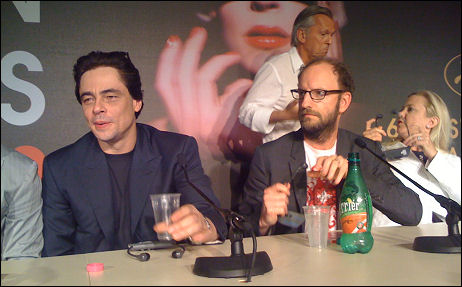
Che star Benicio del Toro, director Steven Soderbergh during just-concluded press conference — 5.22.08, 12:40 pm.
“There’s the painter who did a portrait of a woman, and when she saw it she said, ‘It doesn’t look like me.’ And the painter replied, ‘Oh, it will.'” — Benicio del Toro responding more or less to the same.
Honestly…
What does it say about people presumed to know a great deal about the art of movies but who put down or dismiss a film that eschews conventional drama (intimate revelations, emotional moments, striking plot turns) but delivers like a wizard in terms of convincing the viewer that what’s on-screen isn’t a product of the usual prepared trickery but something intensely scrupulous and honest and, as far as it goes, as “real” as it gets’? What does it say about people who see a film like this and go “meh” ? You can’t watch a live-wire film like Che and say “give me more.” It is what it is, and it gives you plenty. Take no notice of anyone who says it doesn’t.
Exit The Shallows
“Unfortunately, at least in the balcony which is out of the sight line where the filmmakers sit, the crowd noticeably thinned after intermission. A little less than half the seats in my 50 seat or so section were suddenly empty along with dozens of others scattered throughout the upper regions. Perhaps those moviegoers had dinner reservations somewhere? Or maybe they just knew how it was going to end. We’ve said it before and we’ll say it again: You can’t please everyone in Cannes.” — from Pete Hammond‘s Envelope report about last night’s Che screening.
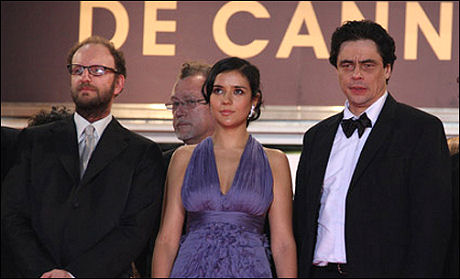
Che director Steven Soderbergh, costar Catalina Sandino Moreno, star Benicio del Toro prior to last night’s Grand Lumiere showing.
Australia Wakeup
Manhattan media maven Bill McCuddy attended a midnight showing of Indiana Jones and the Kingdom of the Crystal Skull at the Zeigfeld last night, and reports that the trailer for Baz Lurhman‘s Australia got booed. What does that mean? That Spielberg fanboys have had it up to here with Nicole Kidman…? It can’t be about Luhrman or Hugh Jackman. I’m grasping at straws, but I know that boos from paying audiences are a bellwether that distributors can’t afford to ignore.
Good Old Boys
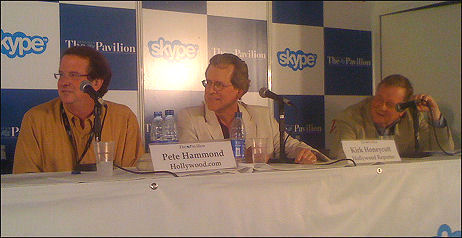
Panelists at yesterday’s American Pavillion discussion about the dismissing, elbowing-aside and evolving dinosaur-ization of venerated dead-tree film critics (l. to r.): The Envelope‘s Pete Hammond, Hollywood Reporter critic Kirk Honeycutt, Time‘s Richard Schickel. (Coverage of this discussion will post later today.)
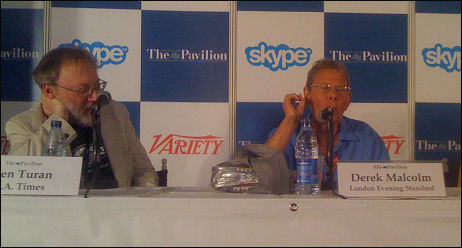
L.A. TImes critic Kenneth Turan (l.); Guardian critic Derek Malcom (r.). Christian Science Monitor critic Peter Rainer also took part in the discussion via Skype video linkup.

Thursday, 5.22, 9:15 am
Another Salute
Some Came Running‘s Glenn Kenny, writing for Indiewire, liked Che also. He doesn’t exactly convey the doing of cartwheels in the lobby in this piece, but here, at least, is a striking passage: “Good thing that Soderbergh, as far as my opinion is concerned, doesn’t have a rabble-rousing bone in his body. Che benefits greatly from certain Soderberghian qualities that don’t always serve his other films well, e.g., detachment, formalism, and intellectual curiosity.”
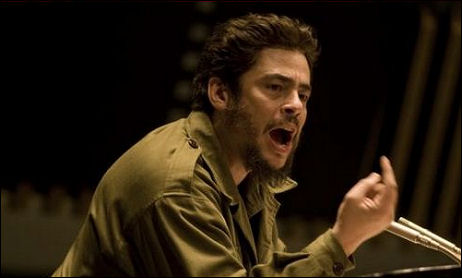
McCarthy’s Pan
“No doubt it will be back to the drawings board for Che, Steven Soderbergh‘s intricately ambitious, defiantly nondramatic four-hour, 18-minute presentation of scenes from the life of revolutionary icon Che Guevara,” writes Variety‘s Todd McCarthy.
“If the director has gone out of his way to avoid the usual Hollywood biopic conventions, he has also withheld any suggestion of why the charismatic doctor, fighter, diplomat, diarist and intellectual theorist became and remains such a legendary figure; if anything, Che seems diminished by the way he’s portrayed here.” HE response: I couldn’t disagree more. In The Argentine Guevara seems about as brave, thoughtful, resourceful and heroic as anyone could possibly imagine or portray him.
“Originally announced as two separate films, The Argentine and Guerrilla,” to be released separately, the film was shown as one picture, with intermission, under the title Che (although neither this nor any other credits appeared onscreen) in its world premiere at the Cannes Film Festival.
“Neither half feels remotely like a satisfying stand-alone film, while the whole offers far too many aggravations for its paltry rewards. Scattered partisans are likely to step forward, but the pic in its current form is a commercial impossibility, except on television or DVD.”
Snack and Debate

Tyson director James Toback, Variety‘s Anne Thompson about 15 minutes after last night’s Che screening — Wednesday, 5.21.08, 11:38 pm. They were both foursquare against me on the film. Not enough drama and emotion, said Thompson, and not commercial. “In the States it’s going to make about $5 million dollars,” said Toback. Che is not any kind of huge box-office hit waiting to happen — we all know that — but for guys like me (i.e., “Sodernerds”), the film is glorious.

Complimentary snack bags, each containing a bland wonder-bread sandwich and a bottle of water — provided by the Wild Bunch marketers (perhaps by the same genius who arranged for the missing transportation to last night’s party!).

